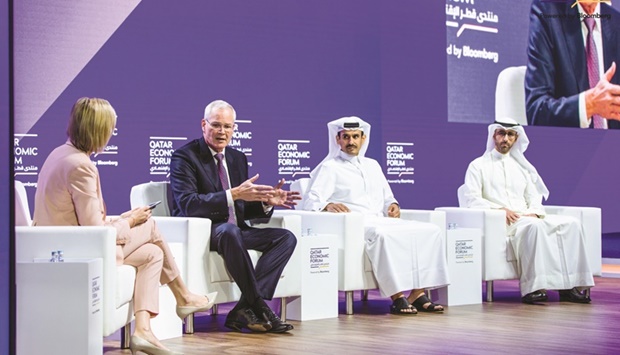Addressing the second Qatar Economic Forum (QEF), powered by Bloomberg, HE the Minister of State for Energy Affairs Saad bin Sherida al-Kaabi said there has been an almost 20% year-on-year decline in capital expenditure in the upstream business over the last seven to eight years.
There was the pandemic and the appurtenant overall slowdown worldwide and then the situation was amplified more by the present Russia-Ukraine issue, he said.
“The under investments is the underpinning reason for much higher (energy) prices,” he said, adding for the system to correct itself, there was a need for higher investments.
The oil market is focused on supply constraints, so prices are likely to remain elevated with strategists at Societe Generale forecasting the black gold at $130 in the third quarter and $120 in the subsequent quarter.
“We need to invest more in the oil and gas sector due to the better revenues the oil companies are getting. Also due to the fact that legislators now understand that you can do transition without the base load cover, which is having investments in the gas business,” he said.
Sheikh Nawaf Saud al-Sabah, deputy chairman and chief executive, Kuwait Petroleum Corporation, said the massive under investments started in 2014-15 and continued and led to discovery of less than 2bn barrel per year.
Typical investment cycle for exploration is seven years from the time oil is discovered, he said.
“In Kuwait, we have increased our exploration and investments in building capacity to meet the requirements for the future,” he said, adding the country has been producing hydrocarbons onshore for the last 80 years.
“We have now taken steps into exploration offshore. The first offshore drill rig arrived in Kuwait last week,” he said.
In terms of capacity building, Sheikh Nawaf said Kuwait Petroleum Company is at present in the commissioning stage of new refinery, which will be the largest in the world at 650,000 barrels of oil per day and that should be online by the end of the year.
It (the new refinery) would be the answer to the increased demand from the Europe, he said, adding under the Opec allocation, oil production could be ramped up by 2.7mn bpd.
Darren Woods, chairman and chief executive of ExxonMobil, said his company is one of the few international oil companies in the US that have been investing in refining.
“We have got a big expansion plan of 250,000 barrels per day (to process the light crude),” he said.
The company had kept investing even during the pandemic, when it lost more than $20bn and had to borrow more than $30bn to maintain investment to increase capacity to be ready for post-pandemic demand.
In a veiled remark to the UK's decision to impose a 25% windfall tax on oil and gas companies; al-Kaabi said "I don’t see the government pitch in when they (oil firms) make losses and borrow when the oil price was negative in Texas."
He said countries should take into account the issue of taxes levied on companies through formulas that ensure a balance in this field, given that the profits achieved by these international oil companies represent their investments in the medium and long term.


